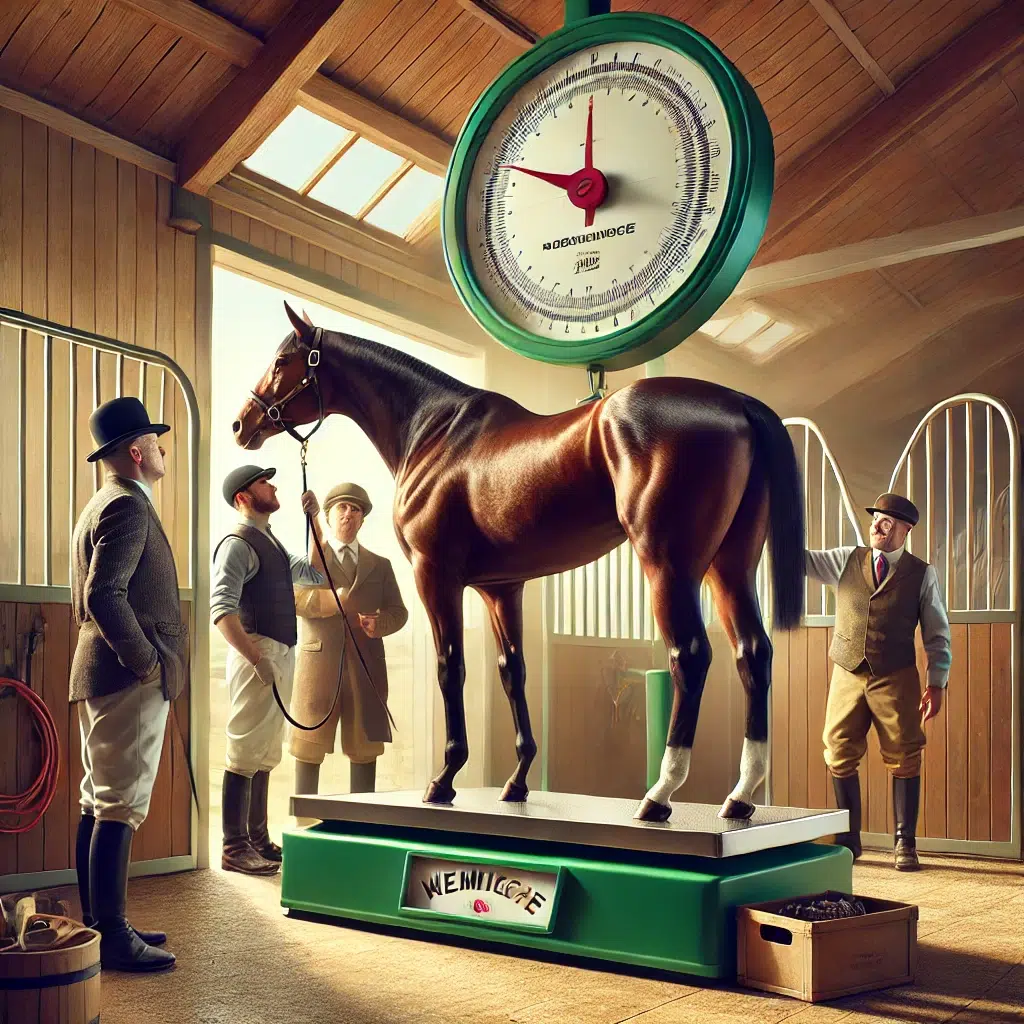
Have you ever ever puzzled how a lot racing horses weigh? This query puzzles many followers of horse racing. It’s essential to know the burden as a result of it performs an enormous half in a horse’s velocity and agility.
A truth price noting is that thoroughbred racehorses have a median weight vary that’s fairly particular to their breed and coaching routine.
This weblog will make clear the typical weight of racing horses, together with components that affect these weights and the way they’re measured. Figuring out a horse’s weight helps trainers maximise efficiency.
Hold studying to search out out extra about this fascinating facet of horse racing.
Common Weight of Racing Horses
Racing horses, particularly Thoroughbreds, normally tip the scales between 450 to 600 kilograms. This weight performs an important position of their velocity and agility on the observe.
Weight Vary of Thoroughbreds
Understanding the burden vary of Thoroughbreds is essential for fanatics of horse racing. These magnificent creatures exhibit a wide range of weights, influenced by a number of components together with breed, age, gender, and coaching routine.
| Class | Weight Vary (kg) |
|---|---|
| Male Thoroughbreds (Stallions) | 500 – 600 |
| Feminine Thoroughbreds (Mares) | 450 – 550 |
| Younger Thoroughbreds (Yearlings) | 400 – 500 |
Male Thoroughbreds, often called stallions, usually weigh between 500 and 600 kilograms. This weight vary showcases their sturdy physiques, important for velocity and endurance on the racetrack. Feminine Thoroughbreds, or mares, exhibit a barely lighter weight vary, from 450 to 550 kilograms, reflecting variations in physique composition and muscle mass. Yearlings, or younger horses aged round one yr, weigh between 400 and 500 kilograms, indicating their creating stage earlier than reaching full maturity.
These weights are indicative of wholesome, race-ready animals, ready to compete on the highest ranges of the game. Correct vitamin, common coaching, and specialised care contribute considerably to sustaining these optimum weight ranges, guaranteeing the horses are in peak situation for racing.
Elements Influencing Racehorse Weight
Racehorse weight varies as a consequence of a number of components. Understanding these aids in assessing a horse’s racing potential.
- Breed: Thoroughbreds are usually lighter and extra agile, ultimate for racing. They usually weigh between 450 to 600 kilograms, corresponding with their want for velocity.
- Age: Youthful horses, of their development part, normally weigh much less. A racehorse reaches its optimum weight at round 5 years previous.
- Gender: Males, or stallions, usually carry extra weight than females. This distinction can affect outcomes in races of combined genders.
- Coaching regime: Intense coaching can significantly modify a horse’s muscle mass and fats ranges, affecting the general weight.
- Eating regimen: Excessive-quality feed appropriate for equine athletes aids in managing weight achieve or loss. Dietary plans are adjusted to fulfill particular person horse’s necessities.
- Well being standing: Diseases or well being points can result in variations in a horse’s weight, influencing its racing situation.
- Seasonal adjustments: Horses might achieve or drop a few pounds with the altering seasons, partly as a consequence of pure physique cycles and coaching modifications.
Every of those components performs a novel position in figuring out the burden and thus the racing proficiency of a horse. Protecting these facets beneath management is vital for guaranteeing the very best racing situation for every equine participant in horse racing.
The best way to Measure a Racehorse’s Weight
Measuring a racehorse’s weight is essential for guaranteeing its well being and efficiency. This course of entails particular steps that have to be adopted rigorously.
- Use a big animal scale: A scale designed for giant animals is important for an correct studying. Most racecourses and coaching amenities have these scales.
- Lead the horse onto the size: Rigorously lead the horse onto the centre of the size to make sure an excellent distribution of weight.
- Calm the horse: A peaceful horse will present a extra correct weight measurement. Take time to appease any nerves earlier than taking the studying.
- Learn the show: As soon as the horse stands nonetheless, observe the burden displayed on the size’s readout.
- Document the burden: Write down the burden instantly to keep up correct information for monitoring any adjustments over time.
- Repeat frequently: Constant measurements are important for monitoring a racehorse’s well being and health ranges, so repeat this course of frequently.
Every step helps trainers and homeowners preserve their horses in high racing situation.
Significance of Weight in Racing Efficiency
Weight is a pivotal think about racing efficiency, significantly amongst Thoroughbreds. These equine athletes require the proper proportion of muscle and agility to attain most speeds.
A bulkier horse might have extra efficiency, however may lack the required velocity, whereas a much less weighty horse could possibly be speedy however not comprise sufficient energy for sustained efforts over prolonged distances.
Trainers try to find this equilibrium, modifying diets and coaching schemes to optimise every racehorse’s weight. The target at all times is to succeed in the perfect combine that augments each velocity and stamina.
In handicapped races, weight takes on an additional strategic significance because it standardises the competitors. Jockeys obtain extra weights based mostly on their horses’ earlier achievements, with the purpose of providing each competitor an equal alternative for victory.
Due to this fact, greedy how weight influences efficiency is important for achievement in these contests. Handlers should put together their horses with thorough consideration to element, ensuring they carry weights that neither decelerate them nor depart them too frail to endure the competition’s calls for.
This intricate act of stability highlights the importance of weight in figuring out racing outcomes.
Conclusion
Understanding the burden of racehorses can present deep insights into the game’s refined particulars. Thoroughbreds usually weigh between 1,000 to 1,200 kilos, this varies by breed and gender.
Specialised devices are used for measuring their weight to make sure accuracy. This info is very helpful for bettering a racehorse’s efficiency by way of tailor-made coaching and weight loss program modifications.
Utilising these insights can vastly affect the result in horse racing, guiding each hobbyists and professionals in achieving optimum horse athleticism.
FAQs
What’s the common weight of a racing horse?
Racing horses usually weigh between 450 to 550 kilograms, though this will range based mostly on components comparable to breed, age, and weight loss program.
Does the burden of a racing horse impression its efficiency?
Sure, it does. A horse’s weight performs a big position in its velocity and endurance throughout races. Sustaining an optimum weight helps make sure that the animal can carry out at peak ranges.
How do trainers handle the burden of their racing horses?
Trainers make use of numerous methods to handle their horses’ weights successfully. These embody cautious monitoring of weight loss program and train regimens, common veterinary check-ups for well being assessments, and strategic relaxation durations to forestall overexertion.
Are there particular breeds of horses which might be extra appropriate for racing as a consequence of their measurement or weight?
Sure breeds like Thoroughbreds and Quarter Horses are sometimes most popular in horse racing as a result of they often have an athletic construct with robust muscle tissue which makes them ultimate for high-speed competitions.
Trending Merchandise




